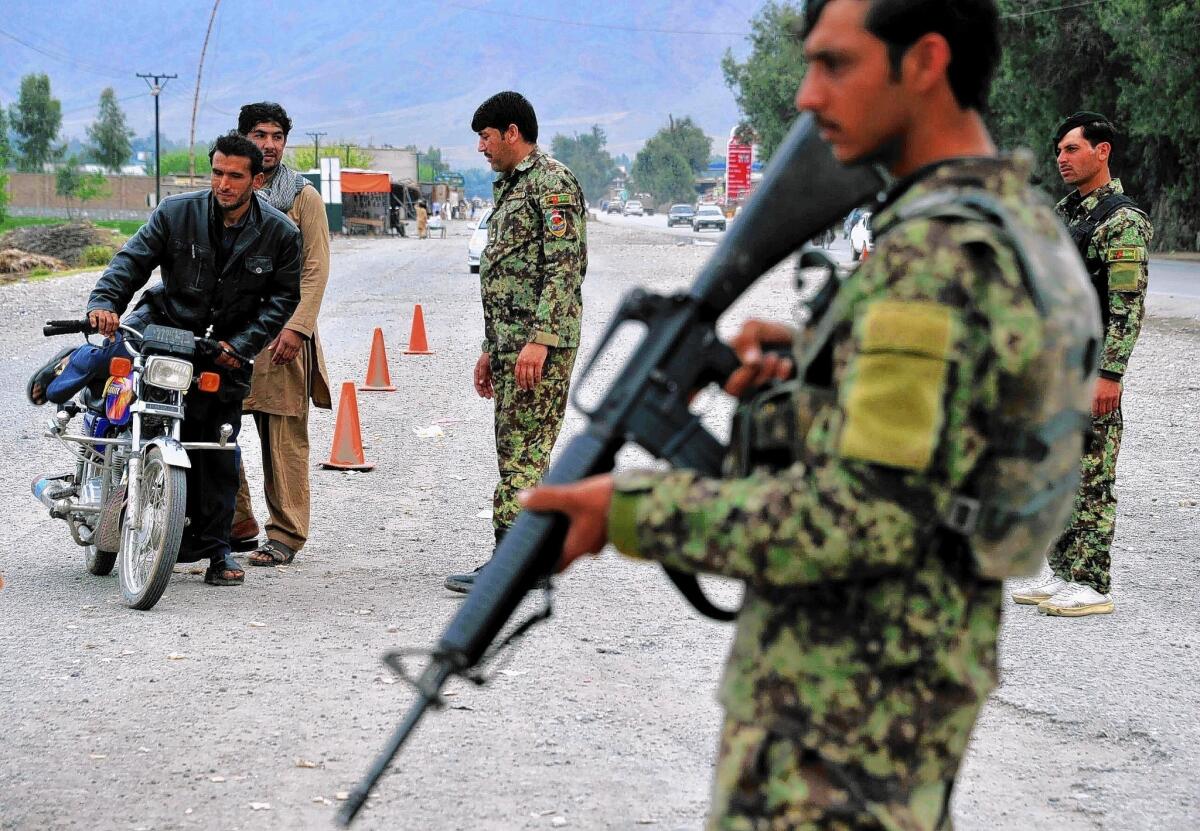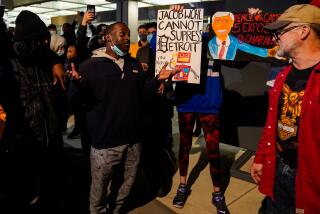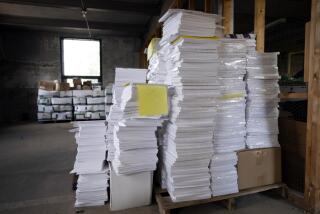Afghan presidential vote may be different this time

KABUL, Afghanistan — The last time Abdullah Abdullah ran for president of Afghanistan the election devolved into a bloody farce.
Votes cast in some areas in 2009 exceeded the number of voters. One in 5 ballots nationwide was tossed out because of fraud. Thirty-one people died in insurgent attacks. Days before a runoff against President Hamid Karzai, Abdullah withdrew from the race, fearing more fraud in the incumbent’s favor.
Five years later, the Karzai era is ending, as is the dominant role of the United States in Afghan life. Almost everyone involved in the presidential election Saturday — a chance at the first peaceful democratic transfer of power in Afghanistan’s history — acknowledges that there again will be irregularities.
Abdullah and others warn about Taliban violence, suspicious voter registration figures and the potential for widespread vote rigging by polling staff and partisan strongmen.
The question is whether the troubles will be extensive enough to undermine what is seen as a major test of Afghanistan’s ability to govern itself as the 13-year U.S. engagement winds down.
“The election officials are trying, they are making efforts,” Abdullah, a former foreign minister who again is a presidential front-runner, said in an interview at his home in Kabul, the capital. “It is a huge logistical operation and it is a huge responsibility as well. The election is critical this time around.”
Nearly 200,000 Afghan soldiers and police officers will be responsible for securing 21,000 polling stations. Unlike in 2009, the commissions charged with overseeing the vote are made up exclusively of Afghans. U.S. officials in Kabul, whom Karzai accused of working against him five years ago, have publicly maintained near silence on the election.
“These are Afghan-owned elections with Afghans acting as the final arbiter of the result,” Jan Kubis, the United Nations envoy to Kabul, said Thursday.
That result is likely to be messy and contentious, and a final outcome may not be known for several weeks. But U.S. officials seem encouraged by the fact that the three leading candidates are polished moderates with international credentials who have said they support a key Obama administration priority: reaching an agreement to keep some American troops in Afghanistan beyond 2014, which Karzai has refused to do.
Western diplomats insist that many signs are positive. Election officials have trained more staff and introduced new methods to track ballots. Long voter registration lines in Kabul and boisterous campaign rallies in the provinces have raised hope that turnout could surpass the lackluster rates of recent contests.
One oft-cited marker of enthusiasm: 3.8 million Afghans registered to vote this year, bringing to more than 21 million the total number of voter registration cards handed out over the last decade. The trouble is that the estimated number of eligible voters is about 13 million, meaning many Afghans hold multiple voter cards.
In previous elections, the biggest fraud came not from individual voters but from cheating en masse — for example, ballot-box stuffing and election results from polling stations that were closed on election day. This year, Abdullah has warned of the possibility of “massive, industrial-scale fraud,” perhaps laying the groundwork for challenging the results if he falls short, which officials fear could throw Afghanistan into extended postelection turmoil.
“We have told the candidates that they should not make these kinds of announcements in public because it undermines the confidence of the Afghans,” said Nader Mohseni, spokesman for the Independent Electoral Complaints Commission, which is tasked with investigating voting irregularities.
“Yes, there will be some fraud. But the rate will not be very high,” Mohseni said. “We think this election will be different from every past election.”
With Karzai barred by term limits from running again, the presidential field is wide open, and a lack of reliable polling makes it difficult to gauge support for each of the eight candidates. But most experts believe it is a three-man race.
Abdullah was a close advisor to the anti-Soviet resistance fighters of the Northern Alliance in the 1980s and ‘90s before briefly joining Karzai’s government after U.S.-led forces toppled the Taliban. Unlike the other major candidates, he is not 100% Pashtun, Afghanistan’s largest ethnic group; many observers regard this as a liability, particularly in a runoff against a Pashtun rival.
Another leading candidate, Ashraf Ghani, is an economist who worked at the World Bank, taught at Johns Hopkins University and has served in key posts under Karzai, including as point man for the transition of security responsibilities from the U.S.-led NATO coalition to Afghan forces. But Western officials cringed when, in an obvious bid to secure the vote of the large Uzbek minority, Ghani named as his running mate Uzbek leader Abdul Rashid Dostum, who is accused of war crimes in the 1990s Afghan civil war.
The least known of the front-runners is Zalmai Rassoul, a longtime Karzai advisor who until recently served as foreign minister. A soft-spoken Francophone physician who seems more comfortable in plush hotels than at packed stadium rallies, Rassoul lacks a strong support base but has the backing of two of Karzai’s brothers and, many believe, the president.
Rassoul has appeared at rallies in front of giant posters of the president, reinforcing suspicion that Karzai, who has avoided endorsing a candidate, is maneuvering to install Rassoul and wield power from behind the scenes. The election complaints commission last week fined local officials in the eastern province of Paktia for using government resources to campaign for Rassoul and forcing some residents to attend a rally for him.
Hovering over it all is the threat of Taliban violence, after several major attacks in Kabul in recent weeks and reports from provinces ringing the capital that insurgents have circulated letters warning they would slice off the fingers of anyone who participated in the election. The insurgent group has described the election as a foreign plot.
In Wardak province, just outside Kabul, officials in the Taliban-riddled Sayed Abad district said that they had been unable to disseminate election materials to their roughly 40 polling centers by Thursday night, raising doubt that voting would take place Saturday. In Logar province, six districts, comprising dozens of polling centers, lacked the necessary security to participate in the election, a provincial official said.
“The people are interested in voting, but they won’t,” Mohammad Qais, a member of the local council in Sayed Abad, said by phone. “They are afraid of being killed by the Taliban.”
Special correspondent Hashmat Baktash contributed to this report.
More to Read
Start your day right
Sign up for Essential California for news, features and recommendations from the L.A. Times and beyond in your inbox six days a week.
You may occasionally receive promotional content from the Los Angeles Times.







